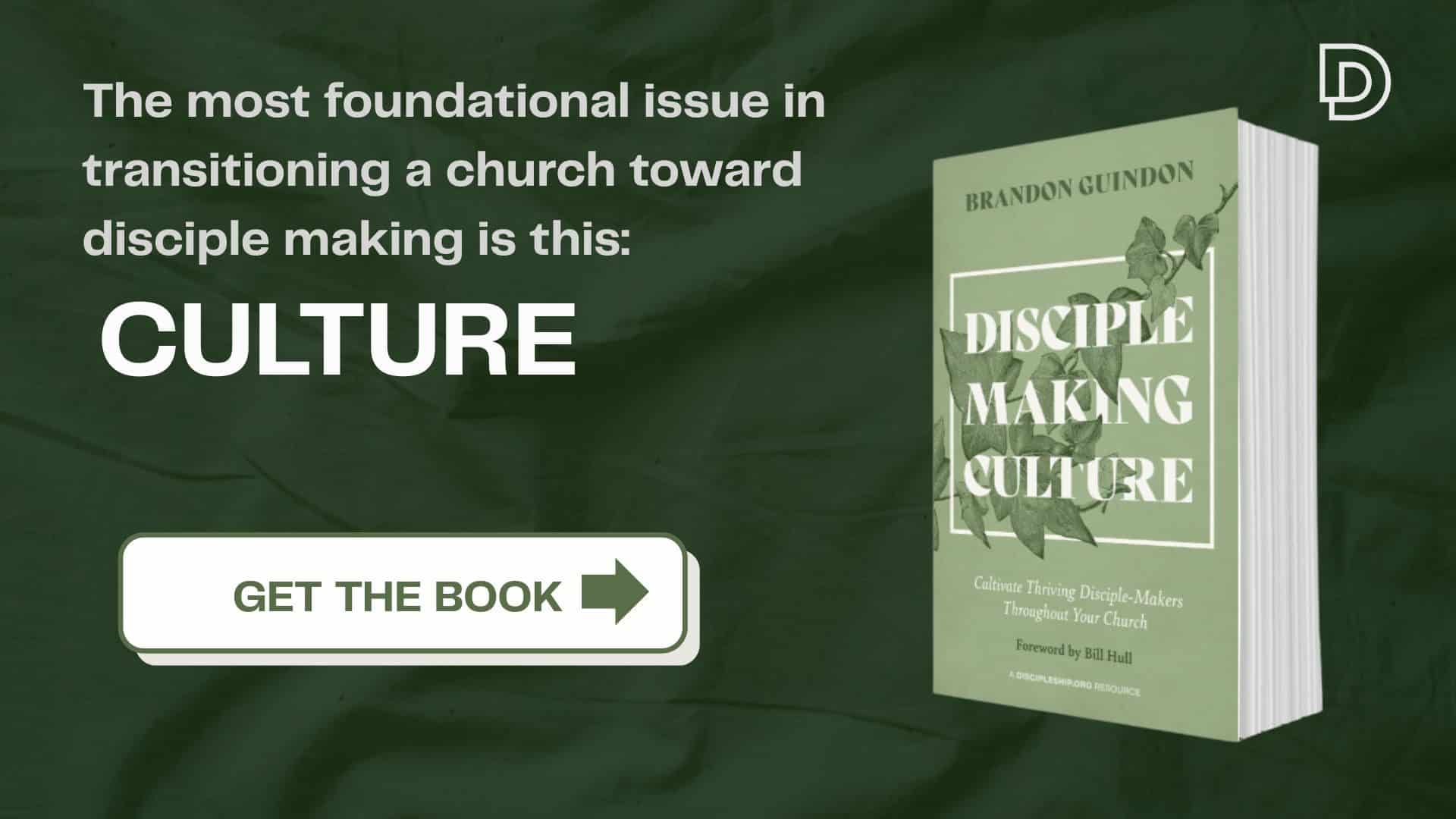Creating a Disciple-Making Culture: A Deep Urgency for the Church Today.

The most fundament issue in transitioning a church to a disciple making focus is culture. So, to help you, I want everyone to know about a discipleship.org book, Brandon Guindon’s Disciple-Making Culture: Cultivate Thriving Disciple-Makers Throughout Your Church. Brandon identifies the key components of a healthy disciple-making culture, and he points back to Scripture at how Jesus made disciples and his original design and plan for the culture of the church.

Rain pounded the windows of my office on that early May afternoon. Sitting in my office enjoying a conversation at the small conference table with Mike (not his real name), a senior pastor of a church several hours from my local community of Tomball. We were discussing disciple making in our local churches. Mike and I met several months before during a DiscipleShift training our church Real Life Ministries Texas hosted for the Relational Discipleship Network (RDN). During the conference, the Lord deeply moved in his life and gave him a hunger to shift his church to become more focused on making disciples. Before our coffee at the conference table, Mike spent several hours of the morning with my staff and sitting in our team meetings. He wanted to see what it was like in the everyday life of our team and as he said, “be a fly on the wall”. He knew how strongly we believed in making disciples and the focus of our church was accomplishing the Great Commission. He wanted to come experience what we do. I welcomed the opportunity, and he took me up on the invitation.
With the afternoon still ahead of us I asked him what he had taken away from his morning with our team and even a couple volunteers that were around our offices that day. I remember his comments well.
“Culture”. Mike said.
“What do you mean”? I asked.
“You all have a language you use, but more clearly, that language is put into action by how you live. The culture here is one that syncs up with a language and behavior of disciple making”. Mike said.
I replied with a question. “So, would you say the staff and I live out something, a lifestyle”?
Mike took a sip of his black coffee and began to describe to me ways he saw our staff live out a culture of disciple making. He gave examples of how he heard multiple staff members describe the groups they lead, the disciples they had released, the hurting they were caring for and most important to him was how our staff cared for each other. He then went on to describe where he thought he was missing it with his staff. Mike described areas of his staff that sounded healthy, but he would say that disciple making was not really the culture of his staff. He wanted desperately to make the changes in himself, the staff and the church body that would reflect more of a disciple making culture. His words to me were… “we are just too Sunday morning focused and lack a laser focus”. He went on to add and say, “we have a culture of doing programs rather than making disciples”.
The conversation circled back to his observation…culture. A common topic in the church today is “culture”. Unfortunately, in my conversations with leaders, pastors and church members I hear negative descriptions such as toxic, fear-based or even, controlling. Like Mike’s comments, I frequently hear some version of a programmatic culture rather than a culture built on living out the Great Commission. Programs, in of themselves, are not bad but they should never be the foundation of a church’s culture.
In my book Disciple-Making Culture, I wanted to address one of the most crucial and often neglected components of church health: the culture that undergirds disciple-making. By the grace of God, I have had the honor serving in ministry for over 25 years and been part of a strong disciple making movement within the family of Real Life Ministries churches. From what I have learned and personally experienced, I want to challenge leaders in the church to go beyond strategies or programs; to dig beneath the surface and explore the values, language, and behaviors that shape the environment of a church community. Time and time again I see churches try to address disciple making yet lack a culture that naturally and persistently stands on biblical values that promote disciple making the way Jesus modeled in the New Testament. In a time when many churches face decline, disconnect, and disillusionment, I hope to inspire pastors, elders, volunteers and the entire body of the local church to walk down the path of returning to the roots of Jesus’ Great Commission.
Understanding Culture Beyond Programs
One of the most critical aspects Mike and I discussed that day over coffee, is the emphasis on culture as something deeper than methodology. Culture is not what we say we believe, but what we live out. This distinction is critical. Many churches espouse the importance of discipleship, yet fail to create an environment where disciple-making is normative. In such cases, discipleship becomes a ministry program or “department” rather than a lifestyle. Did you catch that? I want to say it again, even stronger. When we relegate disciple making to anything less than a lifestyle, it will become programmatic and something we just hold as optional. Living out the Great Commission is not an optional command; it is a mandate to all disciples given by our King.
To build and live out a disciple making culture, it must encompass shared beliefs, values, and behaviors that define how a community functions. In the church, this means that everything—from the way leaders interact with members, to the priorities set by the leadership team, to the language used from the pulpit—either reinforces or undermines the culture of disciple-making.
The Biblical Mandate
Jesus’ command in Matthew 28:19–20, the Great Commission, is not simply a call to evangelize, but to “make disciples.” This requires more than a one-time conversation or a Sunday morning attendance; it calls for intentional relationships, spiritual formation, and multiplication. Every part of disciple making is held together by the glue of relationship. Jesus modeled it and the early church carried it on throughout the New Testament, living out a disciple making mandate in the face of heavy persecution.
The early church thrived not because of its buildings, budgets, or charismatic leaders, but because disciple-making was embedded into its DNA. Paul’s relationship with Timothy, Barnabas’ encouragement of Paul, and the house churches in Acts all point to a dynamic culture where believers took personal responsibility for growing in Christ and helping others do the same. This culture so strongly lived out the mandate that Paul praises the church in Thessalonica in 1 Thessalonians 1:6-8
6 And you became imitators of us and of the Lord, for you received the word in much affliction, with the joy of the Holy Spirit, 7 so that you became an example to all the believers in Macedonia and in Achaia. 8 For not only has the word of the Lord sounded forth from you in Macedonia and Achaia, but your faith in God has gone forth everywhere, so that we need not say anything.
Look what is happening here! Paul and his disciples had imitated Christ, the people of Thessalonica imitated them and from there, the region of the world was changed by this culture of disciple making that went forth and impacted the world. A culture of imitating, reproducing Jesus’ style of disciple making was who they were.
We must return to this model. Church cultures today are more focused on innovation and less on imitation. The pursuit of the next new attractive ministry idea rather than old, yet simple practices has harmed more than helped. The church must recover not only the practice but also the culture of disciple-making.
The Components of a Disciple-Making Culture
Mike and I came back together later that afternoon and we had a great conversation around what God was doing in the churches we were leading. He asked one of the most important questions that I think any of us can ask. How? How do we build the same kind of culture that Jesus and the early church had? How do we build a culture of disciple making?
This question is what I answer in Disciple Making Culture, but I want to give some applications that might inspire you today and maybe prompt you to check out my book.
Relational proximity:
Disciple-making doesn’t happen in a classroom alone; it happens life-on-life. The critical importance of relational proximity and authenticity must be embraced. We must be willing to walk alongside others, modeling Christ and investing time and energy into personal growth. Knowing disappointment, failure and even rejection come with this kind of methodology. Read any book of the New Testament, and one will find, how deep relational trials come with the Great Commission. Yet, so does life change. Witnessing the deep work from the transformative power of the Holy Spirit is so impactful for our faith and those we disciple. Life change and spiritual growth happen in those sacred times with others and one will never see it beyond a surface level without relational proximity.
Intentionality:
Discipleship is not accidental. I cannot stress enough, the importance of purposeful modeling for others, the life of following Jesus that comes from being intentional. One must not assume those we disciple are applying what we are teaching them. Like Jesus, we must walk with an incredible intentionality in order for us to see the values of King Jesus passed on to those we invest in.
Reproducibility:
A healthy culture trains disciples to become disciple-makers. We must think beyond retention and attendance, and fix our eyes toward sending and reproduction. This mindset fuels sustainable growth and aligns with the exponential vision Jesus had for the church. When we understand that a disciple maker begins with the end in mind, just as Jesus told his disciples, one day you will go fish for men, we too must know we will be sending out those we disciple.
Challenges and Resistance
Shifting a church’s culture is not easy. In my conversation that day with Mike, I remember hearing the anxious tones in his voice as he contemplated next steps. He knew that any changes in the culture would need to start with him. To shift the culture, I told him, requires patience, courage, and consistency. Yet he did not have to do it alone! I encouraged him to lean into the Lord and pursue building relationships with likeminded leaders/churches.
I believe, like with Mike, God is stirring a movement of churches that are willing to do the hard work of cultural transformation. That’s why I share my experiences, and the stories of churches and other leaders that are taking great steps. Change is possible—and worth it.
A Vision for the Future
I believe the Holy Spirit and the Word of God give us the blueprint for revival. The Holy Spirit continues to press into my heart and mind calling the church back to its original purpose. Instead of chasing trends or fads, we must return to what Jesus modeled: making disciples who make disciples.
Churches that embrace this culture, become more than an organization—they become a movement. Impact ripples beyond its walls, influencing families, neighborhoods, and nations. This vision is not just for large churches or exceptional leaders. It is for every local church that wants to be faithful to the mission of Christ.
Click to purchase your copy of Disciple-Making Culture: Cultivate Thriving Disciple-Makers Throughout Your Church or, get bulk discounts here.
If you have enjoyed reading this, please consider joining our email list!











